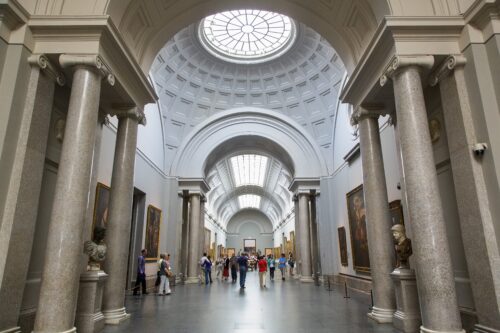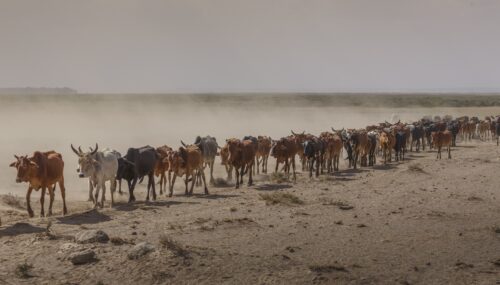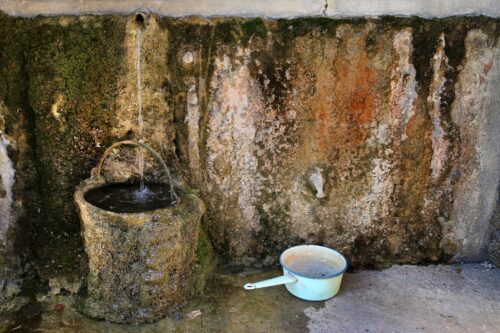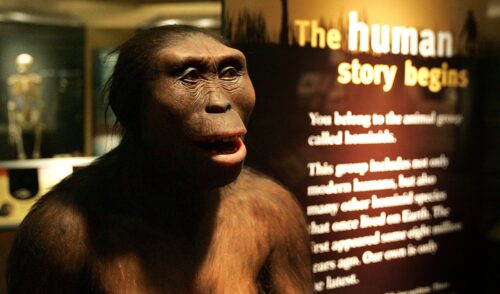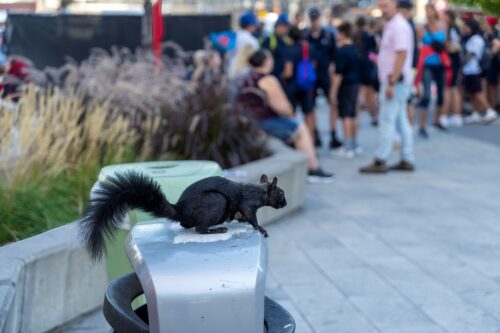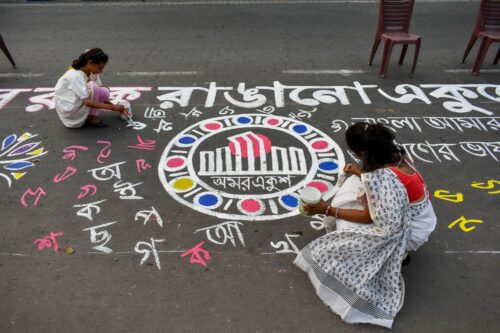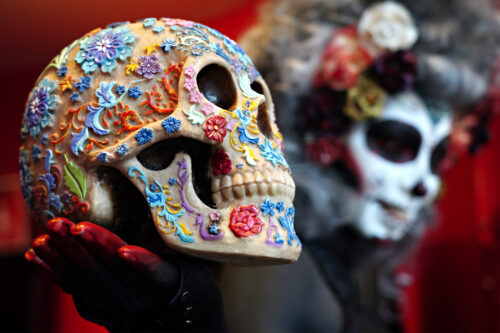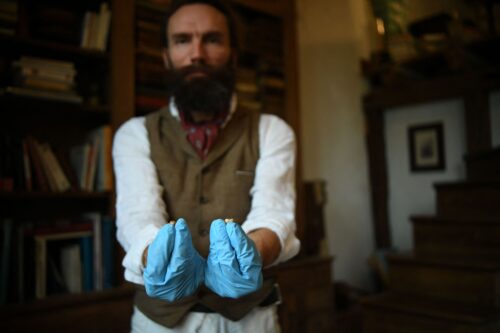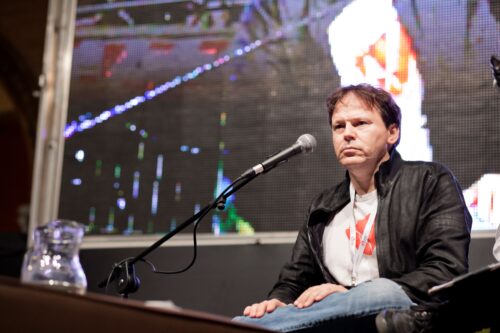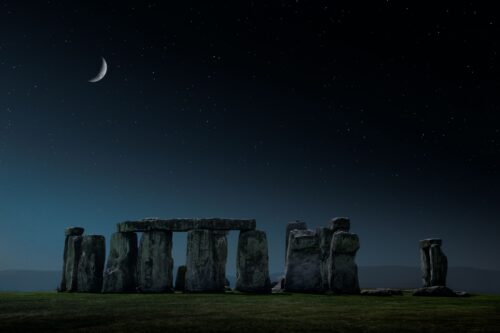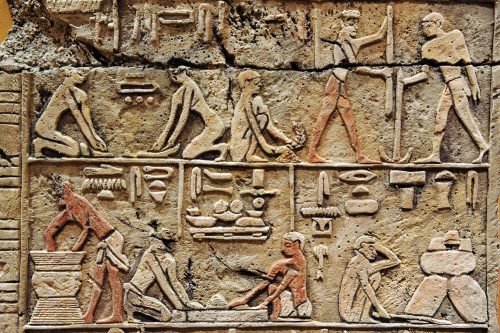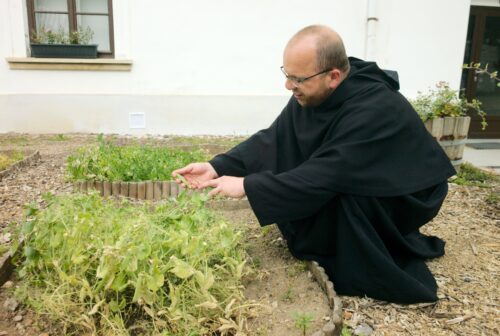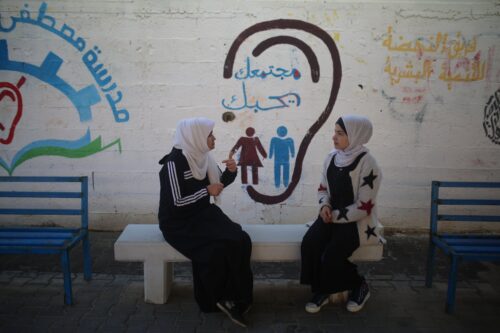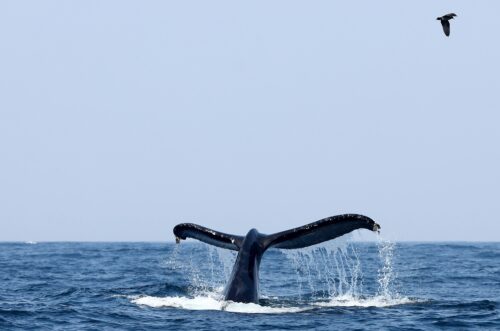Hush-Hush, a Pale-Horse Cometh: Mirabilis Manducat

“O res mirabilis! Manducat Dominum …”
—Saint Thomas Aquinas, 13th Century
I did not know well my Uncle-Cousin Ron. He was my mother’s cousin. He was sick. He died. His death was his body’s failure to handle double pneumonia brought on by an immune system already weakened by HIV, eventually wracked by AIDS. He had apparently been hospitalized for many months before. I was a sophomore in college when it happened, and his death did hurt, but it hurt like a particular degree of pain passed through an elaborate game of telephone. When I think of him, his face emerges like a dull ringing, his voice a distant ache, his body a tinny scratching weighted at the bottom of the receiver. A signal, dropped. A call, lost. Again, I didn’t know him well. I couldn’t have known him well. He and his illness were always Hush-Hush.
PLAGUE.
That was always the issue, wasn’t it? That’s always been the issue, hasn’t it? The Hush? Always followed closely by its other half, Hush. Identical twins, two halves a pale horseman slowly but surely meting out its steady judgment, its silent pestilence, its Slow-Death; Hush-Hush.
Part of it was Him. His Denial. Part of it was our Family. Their Denial. Part of it was the Deep-South. Its Denial. Part of it was the history of our Black. The Denial. Part of it was the reality of our Queer. Our Denial. Part of it was the Disease.
I wonder:
When there is an entire War raging inside of you, which is easier?
The Silence?
Or the Screaming?
PLAGUE.
Silence.
Silence is much easier than releasing all of that negative space, isn’t it? All of that dark disease shrieking toward the void for millennia on end. It is a heart’s keen, the unrelenting grief of containment—a Black body chained captive, a Prisoner-of-War unto itself, within itself, without itself.
No.
Silence is easier than the War. Silence is easier.
The body fights on all fronts, within and without, leukocytes arming themselves with everything they can think of as beautiful. Everything they can think of as magic. Often, they lose. The beauty dies. That is something he used to say, “Beauty dies.” At least on the outside. It is a loss. I do remember that.
PLAGUE.
Human-Immunodeficiency-Virus. Acquired-Immunodeficiency-Syndrome. Black-Death.
It harms the encampment immune system by destroying the white blood cells that fight infection. This places the Body, which is also the Black-Body-Fighting-Black-Death, at Risk. The HIV seeks out these White-Blood-Warrior-Leukocytes, the CD4 cells, burrows inside, takes root, replicates. The virus kills its host. The cycle repeats. Perpetual. Silence is much easier, then.
Plague.
Uncle-Cousin Ron was a singer. I do remember that about him. A beautiful singer. He had a voice like a blended flute, a lifting signal, completely attuned. Every quiver in his elegiac exhalations, polyphonous. His was a found calling. He could weave harmonies more beautiful than choruses of church bells. All that power striking in one Voice. All that voice held in one Body. One body trapping all that Soul. He was a singer. A beautiful one. But by the end, his voice crested untuned, notes without words, twisted hums scattering like broken glass; Silence. A Signal, dropped. A Calling, lost.
Plague.
We were always more similar than our family hoped us to be, he and I. I might have been a singer too. I did not become one, though. I could have. I am very good. I did not. It is amazing what we connect, isn’t it? Trauma does that. Makes you reconsider everything you decided not to do for fear of why you decided not to do it. I do not know why I did not do it. I think, maybe, it was my fear of him. Of us. Of our similarity. Maybe it was another contained scream held so long it twisted from joy to revulsion. Maybe it was for fear of his Voice and All-That-Power in All-That-Body trapping All-That-Soul. Maybe it was for fear of impending loss. He is not among whom I have lost. He is not the only one among whom I have lost. At least, not in these times, not now. He is who I had lost then. He is who had lost himself to himself. He is who I feared would make me want to lose myself too.
That would never have been his fault. That was never his fault.
plague.
No one talks of him much. Still. It is almost as if he were killed in Silence. To speak of him would only kill him again. And again. That is Grief. The recapitulation of a Pale-Horse, the fourth horseman, keening as it kills its fourth of humanity. There is no honor in this victory. There is no joy inherent to Disease. There is no glory belonging to Plague. There never was. Only elegiac lament.
Racism is skeletal. It is Slow-Death taking place from the inside out.
I understand why my family refuses to speak. It is why I refuse to ask. They are afraid. He lost his voice. They would rather not lose it and the memories it houses too. They fail to realize, which is to say they cannot comprehend, the duality in this loss. They are not the same. They are not Us. He lost his voice, yes. But he gained it too. He both lost and gained his voice to the Disease. He both lost and gained his voice to our Queer. He both lost and gained his voice to our Black. He both lost and gained his voice to the Deep-South. He both lost and gained his voice to our Family. He both lost and gained his voice to Himself. To his Body. To his Skin. He both lost and gained his voice to Love.
plague.
I do not know how it happened. The sickness. I do not wish to know. But I imagine, at the end, that he was trying to love his skin and himself free, and in so doing, freed himself from his skin; the only thing left, a skeleton, a shell, a husk of Used-To-Be-Youthful skin stretched taut over ancient bones. He was young, yes, but he had most certainly “been here before.” He was Black, and he was Gay, and in my memory, he was both of those things first. He had been both of those things for the longest of times. There is a feeling, no doubt connected to trauma, of lived-in timelessness that One-Who-Is-Black learns to maintain throughout One’s life in the Deep-South, in the U.S., maybe all over. I believe there is also a pervasive feeling, one endemic to the Ones-Who-Are-Queer, of withholding—a feeling that manifests itself as some amplified moments of elaborate corrosion, the decided extraction of a particular spirit that has existed for millennia, the painfully slow attempts at the excision of white blood cells, on and on, in perpetuity. Which is to say, the feeling of Slow-Death taking place from the inside out, subatomically imploding, a fabulously ancient skeleton corroding in reverse.
p l a g u e .
You see, racism is skeletal. It is Slow-Death taking place from the inside out. It is a reverse corrosion, which is to say, it is foundational. A process of extractive metallurgy, metallic bones bolted deep into the earth, cascading upward, quickly and nonconsensually impregnating, making nests in homes of brutalized Birth-Bodies. Hint: The Birth-Bodies are Black. The Birth-Bodies are Not-White. The Birth-Bodies are made Black because they are Not-White. The Birth-Bodies are Child-Bearing, bearing Steel-Iron-Copper-Brass-Nickel-Children they heft onto their shoulders, one atop the other, over and over, in perpetuity. Bodies weighted by the freight of American White Supremacy.
And is that not a City? Is that not what a City truly is? A child of Metal and Blood, born of the most inextricable of violations, of the most immutable of strifes, furiously snatched out of birth canals, screams forced inward, untuned notes splintered of words, hums twisted, scattered like broken glass, but always Hush-Hush, but always denied, but always quiet, always leaving the Black-Child-Birthing-Bodies to die in Silence, as fertilizer left for dead, struggling to breathe in the soil they have always tended, in the ground they have always toiled, in the streets they have always paved. Is that not Chicago? Is that not New York? Is that not Los Angeles? Tulsa? Flint? Milwaukee? D.C.? San Francisco? St. Louis? Louisville? Baltimore? Birmingham? Paragons of Black parricides; is that not the Birth of a City?
p l a g u e .
We would call the conception immaculate if it weren’t so clearly impregnable. If it weren’t so clearly, so tangibly heinous. But it is immaculate, isn’t it? These carefully planned cities, built atop Black-Bodies-Made-Birth-Farm-Factories, capitalist intentions woven into every copper wire and every steel beam and every iron gate. All shiny and high-risen and minted and chained and expensive and gentrified and new and gleaming orichalcum. And all the orichalcum is painted white. Except for the parts that are Not-White: the Shadows, the Dark-Crevices, the Inky-Armpits, the Rotted-Underbellies, the Black Ones-Who-Are-Forced-To-Get-Sick-In-Order-To-Keep-White-Others-Alive.
Ah.
P L A G U E .
You see now, don’t you?
It’s coming together, yes?
The connection?
The thread?
The
P L A G U E .
You see now these new Alabaster Cities for what they are? For what they have become? For the Black-Bodies they murder at birth? For the parents they reject swiftly post-conception? For the militant parasites they are at their very core? For how they become the Black-Death that burrows inside, that battles the Black-Body, that takes root, that replicates the Infection, that harms the encampment Immune-System, that seeks to destroy the White-Blood-Cells, that seeks to kill its hosts, that seeks to repeat the cycle over and over and over and over and over again, that inspires the most paralytic of Silences.
It is “easy,” then.
PLAGUE.
I wonder:
How many Black-Bodies must be sacrificed for these Cities to be Born?
How many half-forgotten Uncle-Cousin-Auntie-Sister-Son-Father-Brother-Daughter-Mother-Children must I lose?
How much Loss, how much Grief, how much Screaming will it take until these Cities burn? Until they are coated in the darkest of Ash? Until they are, finally, Black once again?
You must remember, this is a Time-Of-Pandemonium in which people are dying, which is to say mostly Black people are dying, so you see, dying makes me think about burning and about plagues and about queerness, and queerness makes me think about love and about dying and about Love-In-The-Time-Of-Dying and whether or not it is worth it, which makes me think about plagues and my Uncle-Cousin Ron and whether or not for him it was worth it, and It-Being-Worth-It makes me think about Death; Slow and Quick, Silent and Screaming, Burning and Black. It is amazing what we connect, isn’t it?
The Pale-Horse cometh. A Pestilence. A plague. But mirabilis Manducat all the same, yes?
Yes.



